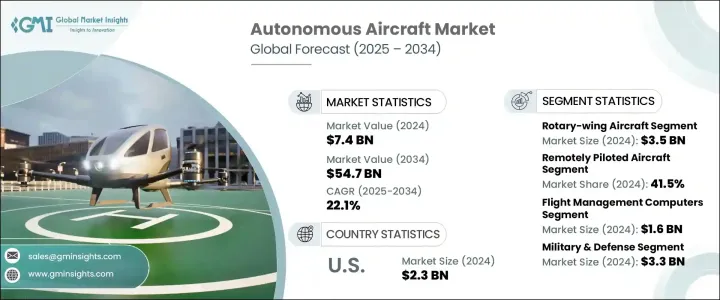
자율형 항공기 세계 시장 규모는 2024년에 74억 달러로 평가되었고, 도시 지역의 에어 모빌리티 솔루션 수요 증가, 라스트마일 배송 채널 확대, 민간 및 상업 부문의 투자 증가 등이 함께 CAGR 22.1%로 성장하여 2034년에는 547억 달러에 이를 것으로 예측되고 있습니다.
인공지능, 센싱기술, 배터리 효율의 진보로 자율형 항공기는 물류, 긴급 대응, 여객 수송의 각 분야에서 견인력을 늘리고 있습니다. 엄청난 자금을 제공함으로써 혁신을 지원하고 있습니다. AI를 탑재한 자율 시스템의 채택은 인구 밀도가 높은 도시 환경에서 물류의 과제를 극복하는 데 도움이 되고 항공 운송의 대체 수단에 대한 관심을 높입니다.

기존의 운송 시스템을 대체하는 보다 안전하고, 빠르고, 효율적인 대체 수단에 대한 요구에 따라 항공에서 자율성으로의 이동도 가속화되고 있습니다. 세계의 규제기관이 보다 엄격한 배출기준과 기후정책을 부과하는 가운데, 항공업계는 보다 깨끗한 추진기술로 전환하고 있습니다.
| 시장 범위 | |
|---|---|
| 시작 연도 | 2024년 |
| 예측 연도 | 2025-2034년 |
| 시작금액 | 74억 달러 |
| 예측 금액 | 547억 달러 |
| CAGR | 22.1% |
eVTOL 분야는 도시 지역의 항공 모빌리티가 기세를 늘릴수록 2034년까지 117억 달러에 이를 것으로 예측되고 있습니다. 도시의 혼잡이 진행됨에 따라 eVTOL은 단거리 도시 이동에 필수적인 솔루션으로 떠오르고 있습니다.
원격 조종 항공기 부문은 2024년에 41.5%의 점유율을 차지했습니다. 서비스에서 점점 더 중요해지고 있으며 안전성과 효율성을 높이면서 정확하고 데이터 주도의 결과를 제공합니다.
미국 자율형 항공기 2024년 시장 규모는 23억 달러로 평가되었고, 항공기의 안전성과 자율성을 강화하는 AI, 자동화, 센서 시스템의 개발에 지지되고 있습니다. 수요가 UAM의 혁신을 뒷받침하고 있습니다. 또한, 방위 부문은 전술 작전, 정찰, 감시를 위한 자율형 드론에 대규모 투자를 실시하고 있어 국내 시장의 확대를 더욱 가속시키고 있습니다.
세계 자율 항공기 시장의 주요 기업으로는 보잉, 록히드 마틴, 에어로빌로먼트, 에어버스, 노스롭 그라만 등이 있습니다. 기술계 신흥기업과의 협업파트너십은 전략적 성장의 초석이 되고 있습니다.
The Global Autonomous Aircraft Market was valued at USD 7.4 billion in 2024 and is estimated to grow at a CAGR of 22.1% to reach USD 54.7 billion by 2034, fueled by a combination of rising demand for urban air mobility solutions, the expansion of last-mile delivery channels, and increasing investments from both private and commercial sectors. With advancements in artificial intelligence, sensing technologies, and battery efficiency, autonomous aircraft are gaining traction across logistics, emergency response, and passenger transport. Governments and private entities support innovation through substantial funding for R&D, prototyping, and mass production efforts. Adopting AI-powered autonomous systems is helping overcome logistical challenges in densely populated urban settings, driving interest in aerial transport alternatives.

This shift toward autonomy in aviation is also accelerating due to the need for safer, faster, and more efficient alternatives to traditional transport systems. Additionally, increased interest in environmentally responsible transport is steering development toward electric and hybrid systems, further reinforcing the push for autonomous flight capabilities. As global regulatory bodies impose stricter emission standards and climate policies, the aviation industry shifts toward cleaner propulsion technologies. Electric and hybrid-electric propulsion systems are gaining widespread attention for their potential to significantly reduce carbon emissions, noise pollution, and operating costs.
| Market Scope | |
|---|---|
| Start Year | 2024 |
| Forecast Year | 2025-2034 |
| Start Value | $7.4 Billion |
| Forecast Value | $54.7 Billion |
| CAGR | 22.1% |
The eVTOL segment is projected to reach USD 11.7 billion by 2034, as urban air mobility gains momentum. These aircraft, capable of vertical take-off and landing, are useful in space-constrained urban centers. Innovations in electric propulsion and battery technology continue to enhance their performance, range, and viability for commercial use. As cities become more congested, eVTOLs emerge as a critical solution for short-distance, intra-city travel. Their compact design and ability to operate without long runways make them ideal for on-demand transportation, medical emergencies, airport shuttles, and cargo delivery.
The remotely piloted aircraft segment is anticipated to hold a 41.5% share in 2024. The widespread integration of AI, machine learning, and advanced sensors in unmanned systems has transformed their operational capability. These aircraft are increasingly vital in surveillance, agriculture, logistics, and emergency services-delivering precise, data-driven results with enhanced safety and efficiency. Their ability to carry out complex tasks in hazardous or inaccessible environments makes them indispensable across various industries.
United States Autonomous Aircraft Market was valued at USD 2.3 billion in 2024, supported by developments in AI, automation, and sensor systems that enhance aircraft safety and autonomy. Rising urban congestion and demand for flexible mobility options are encouraging UAM innovations. Additionally, the defense sector is making large-scale investments in autonomous drones for tactical operations, reconnaissance, and surveillance, further accelerating domestic market expansion.
Key players in the Global Autonomous Aircraft Market include Boeing Company, Lockheed Martin Corporation, AeroVironment Inc., Airbus S.A.S., and Northrop Grumman Corporation. To strengthen their position, leading companies in the autonomous aircraft industry invest in AI-driven flight systems, autonomous navigation software, and advanced sensor platforms. Collaborative partnerships with defense agencies, commercial transport providers, and tech startups are becoming a cornerstone of strategic growth. Several companies are expanding their portfolios with electric-powered and hybrid autonomous aircraft tailored for civil and military use. They focus on obtaining regulatory certifications, participating in pilot programs, and ramping production facilities to scale commercialization.